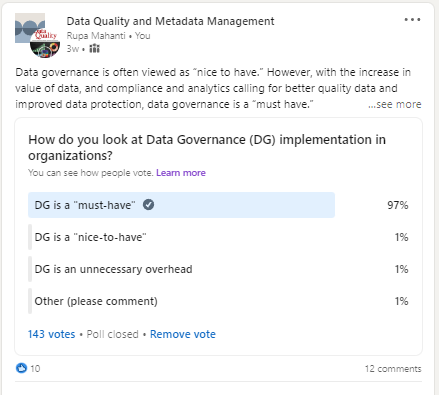Why is Data Governance Important?
What Exactly is Data Governance and Why Is It Important?
While good data is an enterprise asset, bad data is an enterprise liability. However, in order to have good data, it needs to be managed effectively, and effective data management requires data governance (DG).
Data governance is the exercise and enforcement of policies, processes, guidelines, rules, standards, metrics, controls, decision rights, roles, responsibilities, and accountabilities to manage data as a strategic enterprise asset.
Data governance enables effective and proactive management of data assets throughout the enterprise by providing guidance, as in “how to do it,” in the form of policies, standards, processes, and rules. It also helps in defining roles and responsibilities to determine who will do what with respect to data. Companies that govern and manage their data effectively are able to achieve a competitive advantage in the marketplace.
Why is Implementing Data Governance Difficult?
While implementing data governance is not rocket science, it is also not a simple exercise. There is a lot of confusion around the what, why, and how of data governance, and as a result, a lot of challenges arise in the implementation of data governance. Data governance is not a “project” or a “one-off exercise,” but a journey that involves a significant amount of effort, time, investment, and cultural changes that must be taken into consideration to achieve and sustain its success.
Data governance is often overlooked, and its value is grossly underestimated. Some organizations are still not aware of data governance. A lot of people are highly sceptical about data governance. Data governance is frequently regarded as a "nice to have."
DG implementation in organizations is fraught with challenges and perceptions and is often seen as restrictive and an unnecessary overhead, even by data professionals.
Data Governance Implementation Poll
How do you look at Data Governance (DG) implementation in organizations?
I ran a 7-day poll in the Data Quality and Metadata Management group, a data-focused group on LinkedIn, which has more than 6,000 data quality and data governance leaders, practitioners, and advocates across the globe, with the very same question, and the responses are as shown in the screenshot below.
The poll closed with 143 votes from data quality and data governance professionals, and the details are as follows:
The majority (97%) chose that DG is a "must-have."
1% chose the option, "DG is a nice-to-have."
1% chose the option, "DG is an unnecessary overhead."
1% chose the "Other (please comment)" option.
With the increase in value of data and compliance, and analytics calling for better quality data and improved data protection, data governance is definitely a "must have," and this is reflected in the poll response, with a very high majority of 97% of respondents choosing this option.
Concluding Thoughts
Data governance empowers and facilitates good behavior with respect to data and restricts behavior that creates risks with regard to it.
There are several business drivers and use cases of data governance, including compliance, reputation management, improving customer satisfaction, better decision making, data security, data privacy, data analytics, big data, improving operational efficiency, revenue growth, mergers and acquisitions (M&A), partnering and outsourcing, and improving data quality.
In today’s rapidly changing digital world, with data growing out of proportion, with new regulations coming into play and existing regulations being revised and having an impact on data, and with good data being a key differentiator for organizations to gain competitive advantage and stay ahead in the market, robust data governance is not optional but essential.
I will wind off this article with the following statement:
Data governance is like a bitter medicinal pill; with the right dosage, its medicinal effects are far-reaching and a must for your data’s health in the long run.
This article is adapted from my book Data Governance Success, the third book in the Data Governance: The Way Forward series, which talks about data governance perceptions and challenges, the key considerations when implementing data governance to achieve and sustain success, data governance strategy, different data governance maturity frameworks, the people and process elements of data governance, and data governance metrics. A summary of data governance—perceptions versus realities can be found in the backmatter of this book, and is available for free download.
References
Mahanti, Rupa, 2021. "Data Governance Success," Springer Books, Springer, DOI: 10.1007/978-981-16-5086-4
If you have any questions or any inputs you want to share, leave a comment here or connect on LinkedIn.



